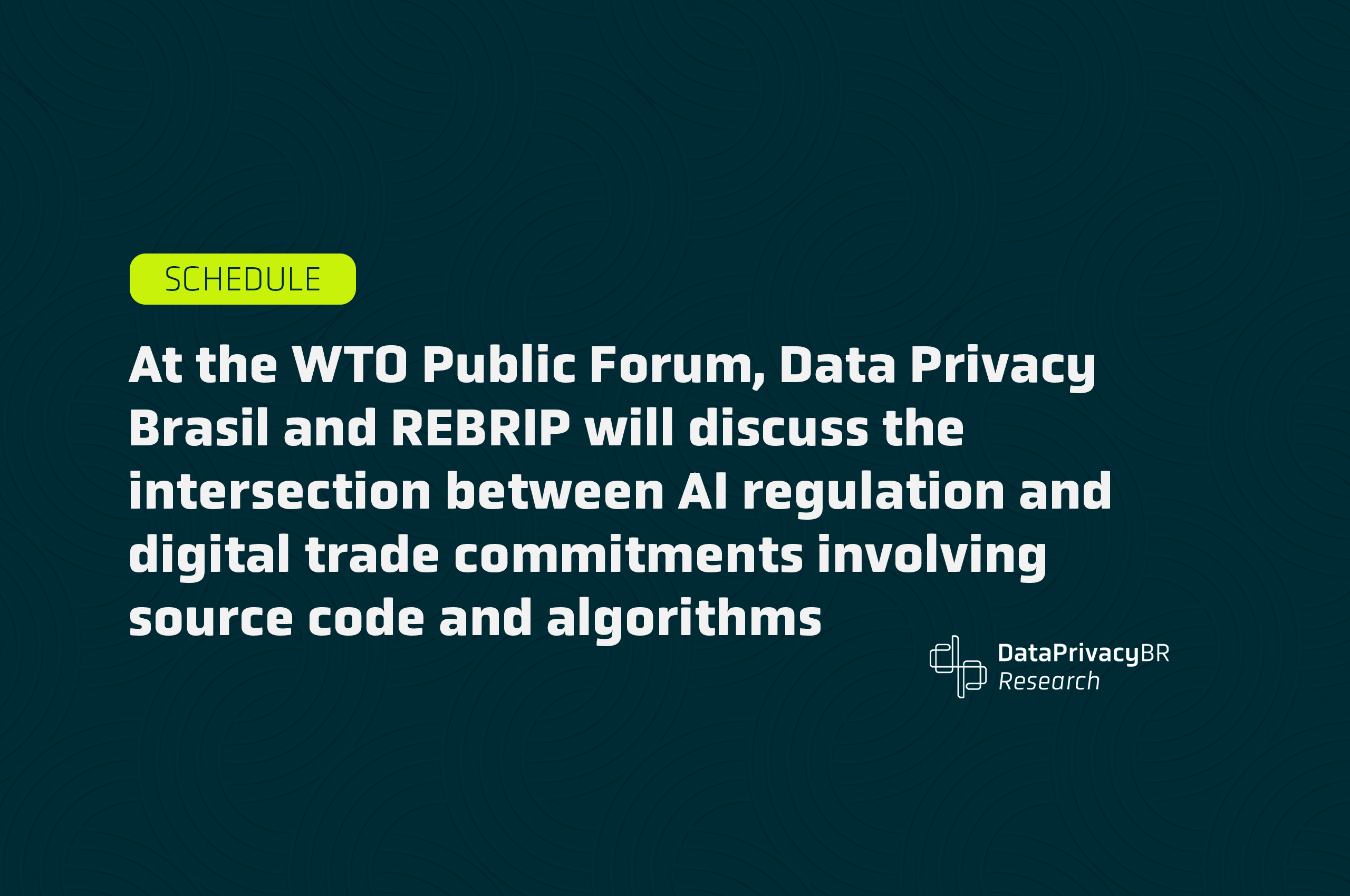At the WTO Public Forum, Data Privacy Brasil and REBRIP will discuss the intersection between AI regulation and digital trade commitments involving source code and algorithms.
The WTO Public Forum 2023 will take place between September 12th and 15th in Geneva.
By Mikael Servilha
[1] [1] Bachelor in Sciences and Humanities and in International Relations from the Federal University of ABC (UFABC), and researcher at the Data Privacy Brasil Research Association. Has been conducting research in international trade and technology, as well as international trade and development., Jaqueline Pigatto
[2] [2] Coordinator of the Governance and Regulation area at the Data Privacy Brasil Research Association, and a master's degree holder in International Relations from the San Tiago Dantas Graduate Program (UNESP, UNICAMP, PUC-SP).and Graciela Rodriguez
[3] [3] Sociologist. Coordinator of REBRIP - The Brazilian Network for the Integration of Peoples. Coordinator of Inst Equit - Gender, Economy, and Global Citizenship. www.rebrip.orgAbout the Forum
The World Trade Organization’s (WTO) Public Forum is an annual event that brings together representatives from governments, civil society, academics, businesses, and other relevant stakeholders to discuss issues related to international trade. According to the WTO, the 2023 Public Forum is intended to focus on discussing ways in which trade and the WTO can contribute to building a more sustainable and environmentally friendly future. Specifically, it aims to “examine how the services sector, digitalization, and inclusive trade policies can play a key role in this purpose.“
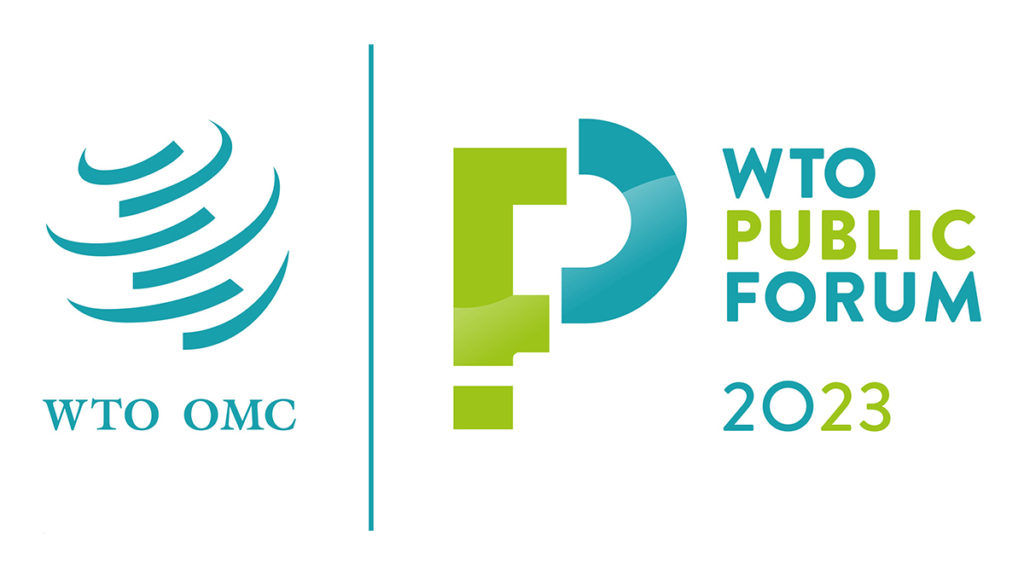
About the Panel
The panel AI Regulation & Trade: Global South Implications proposed by Data Privacy Brasil and the Brazilian Network for the Integration of Peoples (REBRIP) will take place on the penultimate day of the event (14th)
[4] [4] See: https://www.wto.org/english/news_e/news23_e/pf23_24jul23_e.htm. At its core, the session aims to shed light on the interaction between the regulatory space for Artificial Intelligence (AI) regulations in Global South countries and ongoing trade negotiations that discipline access to source code and algorithms—both within the framework of the WTO and in regional/bilateral agreements
[5] [5] Given our emphasis from the Global South, this is a proposal for a complementary discussion, particularly in relation to what Professor Dr. Kristina Irion has been discussing regarding the trade and digital regulation policy of the EU. See: Irion, Kristina, Algorithms Off-limits? If digital trade law restricts access to source code of software then accountability will suffer. 2022 ACM Conference on Fairness, Accountability, and Transparency (FAccT '22). Association for Computing Machinery, New York, NY, USA, 1561–1570. DOI: http://dx.doi.org/10.2139/ssrn.4147375..
In the realm of trade, rules regarding source code and algorithms have largely been defined in a manner closely aligned with the provisions set forth in the CPTPP
[6] [6] Comprehensive and Progressive Agreement for Trans-Pacific Partnership.and USMCA
[7] [7] US-Mexico-Canada Agreement.agreements—with extensive prohibition of access and transfer requirements. These rules are currently under discussion in plurilateral negotiations on e-commerce within the WTO framework
[8] [8] Today, 89 WTO members are engaged in plurilateral negotiations (Joint Statement Initiative on E-commerce). Within this group, those commonly referred to as developing countries from the Global South include, among others: Argentina, Cameroon, Indonesia, Kenya, Nigeria, Uruguay, and Brazil.. They appear in draft texts released by the European Union (EU) for negotiations with Australia, Chile, Indonesia, Mexico, and New Zealand. Furthermore, there have already been commitments in agreements between the EU and countries such as the United Kingdom and Japan.
The session at the WTO Forum is built upon an initial assessment that the advancement of AI can establish significant interactions with socio-economic development processes and rights. Moreover, it emphasizes that when negotiating rules for source code and algorithms, policymakers must go beyond purely commercial considerations and also recognize the importance of human rights, local needs, inequalities, and power asymmetries between countries.
Thus, the panel aims, above all, to prompt reflection on the set of shared needs in the Global South to promote appropriate AI regulations that ensure a high level of human rights protection and do not impede or clash with trade disciplines. In particular, it examines common trajectories and challenges, and identifies the current social, regulatory, policy, and developmental demands of these countries at a time when AI regulatory models are starting to be debated nationally and commitments for digital trade are being defined on the international arena.
As an example, we can highlight the relationship between the impacts of trade secrets and the rights outlined in the Brazilian AI bill. The bill 2338/2023 aims to establish rights for the protection of the most vulnerable—individuals—impacted daily by AI systems, ranging from content recommendation and targeted advertising on the Internet to eligibility analysis for credit decisions and certain public policies. The bill proposes that obligations be heightened when the AI system produces significant legal effects or significant impacts on individuals, such as the right to contest and also to have human intervention.
The panel will be moderated by Melanie Foley (Global Trade Watch). Among the panelists, we will have Mariana Rielli (Data Privacy Brasil); Sofia Scasserra (Transnational Institute); and Deborah James (Our World is not for Sale).
About REBRIP
The Brazilian Network for the Integration of Peoples is a coalition of NGOs, social movements, trade unions, and professional associations that work on Brazilian foreign policy, regional integration processes, and trade. They are committed to building a democratic society based on economically, socially, culturally, ethically, and environmentally sustainable development.
About Data Privacy Brasil
The Data Privacy Brasil Research Association is a nonprofit, nonpartisan civil society organization that promotes the protection of personal data and other fundamental rights from a perspective of social justice and power asymmetries. They believe that ensuring digital rights for everyone is a cornerstone of democracy. Through the creation and dissemination of knowledge and public interest information, they strive to foster a data protection culture guided by a strong social commitment and ethical funding.
Veja também
-
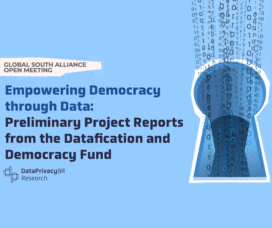
Empowering Democracy through Data: preliminary project reports from the DDF
The Global South Alliance wil host its next open meeting on October 22, 2024, where grantees from the first cohort of the Datafication and Democracy Fund (DDF) will present their impactful research.
-

Protean acknowledged for leadership in digital public infrastructure
A report from Data Privacy Brasil underscores how DPI can be leveraged to create environments where data privacy and security are prioritized.
-
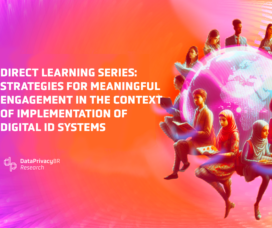
DIRECT Learning Series: strategies for meaningful engagement in the context of implementation of Digital ID systems
This workshop took place on August 28th, 2024, in the context of the Data Rights and Enforcement through Community Trust (DIRECT) Learning Series, an ongoing thematic series of workshops with members of the DIRECT consortium, supported by Internews.
-
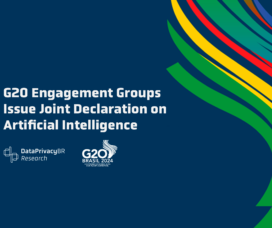
G20 Engagement Groups Issue Joint Declaration on Artificial Intelligence
On Tuesday (10), the main G20 engagement groups, including Civil 20 (C20), Labor 20 (L20), Think 20 (T20) and Women 20 (W20), announced a groundbreaking joint statement on the ethical, sustainable and inclusive development and deployment of artificial intelligence (AI).
-
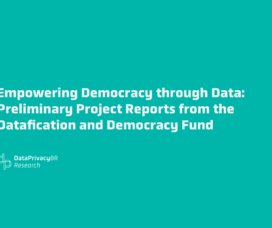
Empowering Democracy through Data: Preliminary Project Reports from the Datafication and Democracy Fund
The Global South Alliance held its first meeting with the organizations covered by the Datafication and Democracy Fund. On the occasion, each of the five organizations - Like a Palm Tree (Africa), Center of Security and Citizenship Studies (LatAm), Corporación Cambio Sostenible (LatAm), Criminal Justice & Policy Accountability Project (India), and Ikigai Innovation Initiative (Africa) - had the opportunity to present the preliminary results of their projects and hear feedbacks from the GSA members.
-
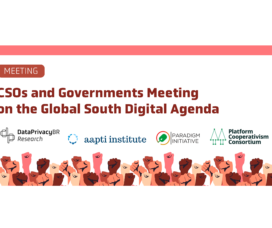
CSOs and Governments Meeting on the Global South Digital Agenda
On September 21st and 24th, the event “Open Dialogue: Global South Alliance and Governments for an Inclusive Digital Agenda” will take place, promoted by the organizations Data Privacy Brasil, Aapti Institute, Paradigm Initiative and PCC (The New School). The event aims to provide an open conversation with diplomats about the international agenda for IPRs, AI, GDC implementation and G20 continuity.
-
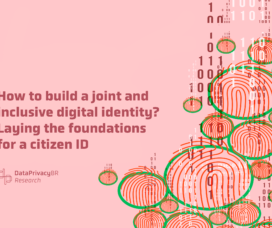
How to build a joint and inclusive digital identity? Laying the foundations for a citizen ID
Do you know what an identity is? Thinking about facilitating access to the topic, Data Privacy Brasil has developed a series of content to provide the foundations and tools possible for all the details on the subject. With this, we will be able to discuss, as a community, what we want with a digital identity and how we can achieve it.
-
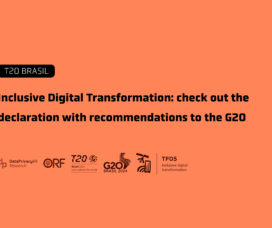
Inclusive Digital Transformation: check out the declaration with recommendations to the G20
In the document, six priorities were defined to deal with issues such as digital inclusion and meaningful universal connectivity; and challenges, opportunities and governance of artificial intelligence.
Veja Também
-

Empowering Democracy through Data: preliminary project reports from the DDF
The Global South Alliance wil host its next open meeting on October 22, 2024, where grantees from the first cohort of the Datafication and Democracy Fund (DDF) will present their impactful research.
-

DIRECT Learning Series: strategies for meaningful engagement in the context of implementation of Digital ID systems
This workshop took place on August 28th, 2024, in the context of the Data Rights and Enforcement through Community Trust (DIRECT) Learning Series, an ongoing thematic series of workshops with members of the DIRECT consortium, supported by Internews.
-

G20 Engagement Groups Issue Joint Declaration on Artificial Intelligence
On Tuesday (10), the main G20 engagement groups, including Civil 20 (C20), Labor 20 (L20), Think 20 (T20) and Women 20 (W20), announced a groundbreaking joint statement on the ethical, sustainable and inclusive development and deployment of artificial intelligence (AI).
-

Empowering Democracy through Data: Preliminary Project Reports from the Datafication and Democracy Fund
The Global South Alliance held its first meeting with the organizations covered by the Datafication and Democracy Fund. On the occasion, each of the five organizations - Like a Palm Tree (Africa), Center of Security and Citizenship Studies (LatAm), Corporación Cambio Sostenible (LatAm), Criminal Justice & Policy Accountability Project (India), and Ikigai Innovation Initiative (Africa) - had the opportunity to present the preliminary results of their projects and hear feedbacks from the GSA members.
-

CSOs and Governments Meeting on the Global South Digital Agenda
On September 21st and 24th, the event “Open Dialogue: Global South Alliance and Governments for an Inclusive Digital Agenda” will take place, promoted by the organizations Data Privacy Brasil, Aapti Institute, Paradigm Initiative and PCC (The New School). The event aims to provide an open conversation with diplomats about the international agenda for IPRs, AI, GDC implementation and G20 continuity.
-

How to build a joint and inclusive digital identity? Laying the foundations for a citizen ID
Do you know what an identity is? Thinking about facilitating access to the topic, Data Privacy Brasil has developed a series of content to provide the foundations and tools possible for all the details on the subject. With this, we will be able to discuss, as a community, what we want with a digital identity and how we can achieve it.
-

Inclusive Digital Transformation: check out the declaration with recommendations to the G20
In the document, six priorities were defined to deal with issues such as digital inclusion and meaningful universal connectivity; and challenges, opportunities and governance of artificial intelligence.
-
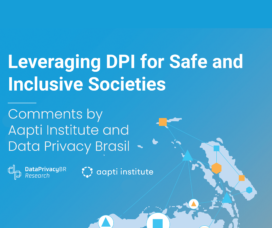
Leveraging DPI for Safe and Inclusive Societies
Aapti and Data Privacy Brasil have submitted their contribution to the Office of the United Nations Secretary-General's Envoy on Technology (OSET) and the United Nations Development Programme (UNDP) regarding the report "Leveraging DPI for Safe and Inclusive Societies".
-
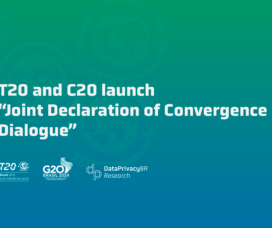
T20 and C20 launch “Joint Declaration of Convergence Dialogue”
On the 2nd and 3rd of July, a Mid-Term Conference took place in Rio de Janeiro, a T20 event with the participation of leaders from national and international think tanks, members of academia, representatives of the private and public sectors and civil society to discuss and propose solutions to the main global challenges.
-

Datafication and Democracy Fund welcomes five organizations from the Global South for short-term projects
The Datafication and Democracy Fund Committee, composed of Data Privacy Brasil, Paradigm Initiative, and Aapti Institute, is pleased to announce the five organizations awarded funding for a short-term research project.
-
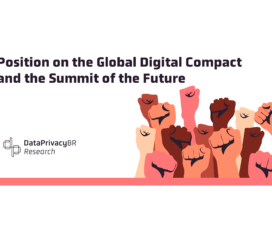
Position on the Global Digital Compact and the Summit of the Future
Between the 9th and 10th of May, the UN Civil Society Conference is happening in Nairobi. The event is presented as an opportunity to engage civil society in preliminary discussions ahead of the Summit of the Future.
-
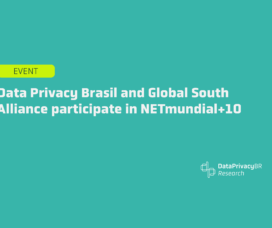
Data Privacy Brasil and Global South Alliance participate in NETmundial+10
Between April 29th and 30th, the NETmundial+10 took place in São Paulo. Building upon the event and the NETmundial Declaration of 2014, this event focused on strengthening global multistakeholder governance for the Internet and digital technologies, as well as conveying messages to global actors for better coordination of various ongoing processes.
-
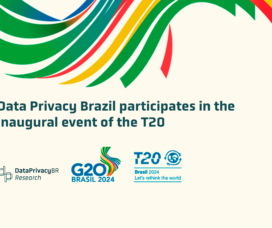
Data Privacy Brazil participates in the inaugural event of the T20
Between March 4th and 6th, the Organizing Committee of T20 Brazil - composed of CEBRI, FUNAG, and IPEA - held the first official event of the engagement group. The event took place entirely virtually and was openly broadcast to the public.
-

Inclusive Digital Transformation in the T20
The year 2024 marks Brazil's presidency in the G20, the group of the world's largest economies, chaired by our country for the first time. It is a year of great opportunity for Brazil to influence a broad global governance agenda, prioritizing issues such as inequality, climate change, and, of course, digital transformations.
-
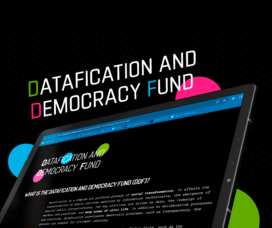
Data Privacy Brasil, Paradigm Initiative and Aapti Institute announce the launch of the “Datafication and Democracy Fund”
The fund aims to finance activities that strengthen the work of NGOs in the Global South on issues of datafication and democracy
-
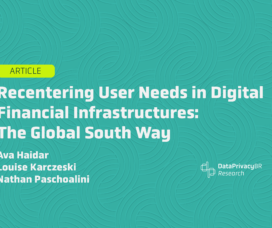
Recentering User Needs in Digital Financial Infrastructures: The Global South Way
Through India’s G20 leadership in 2023, global agendas of digital transformation and financial growth have come to be intimately reoriented to challenges, priorities and special developments in the Global South.
-

At UNCTAD eWeek, Data Privacy Brasil will discuss the intersection between digital economy and human rights in AI regulation
The UNCTAD eWeek, an initiative of the United Nations Conference on Trade and Development (UNCTAD) in partnership with eTrade for all, will occur from the 4th until the 8th of December.
-
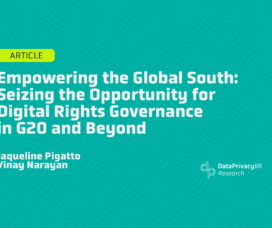
Empowering the Global South: Seizing the Opportunity for Digital Rights Governance in G20 and Beyond
The G20 represents a critical policy space for addressing emergent challenges on a global scale and its importance as a platform is pronounced when we consider its significance for the Global South.
-
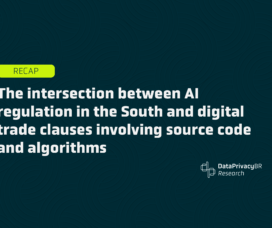
The intersection between AI regulation in the South and digital trade clauses involving source code and algorithms
Recap of Session 43 of the WTO’s 2023 Public Forum organized by Data Privacy Brasil and REBRIP
-
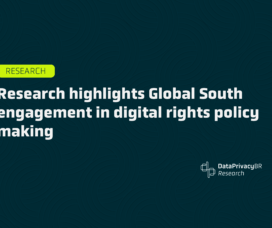
Research highlights Global South engagement in digital rights policy making
The Data Privacy Brasil Research Association announces the launch of the research report on Global South perspectives on international engagement in digital rights.
-

Data Privacy Brasil’s contribution to the Thematic Deep Dive of Artificial Intelligence and other Emerging Technologies of the Global Digital Compact
As other civil society organizations already pointed out, notable preference was given to the speech of Member States, UN agencies, and the private sector, at the expense of human rights civil society organizations, which prevented the speech that had been prepared by the DBPR and other civil society stakeholders.
-
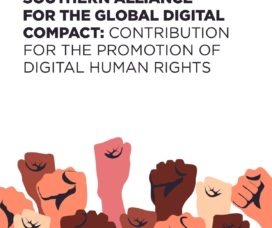
Southern Alliance for the Global Digital Compact
Responding to the call made by the United Nations, the Data Privacy Brazil Research Association, together with organizations from the Global South, presents a contribution to the Global Digital Compact.
-
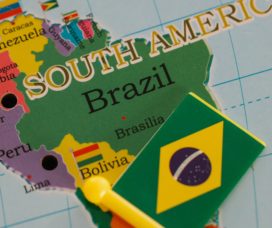
Data Privacy Brasil Research Association contributes to UN open call on the relationship between human rights and technical standard-setting processes
We received a call as an opportunity to submit suggestions to inform the OHCHR report on the relationship between human rights and standard-setting processes for new and emerging digital technologies.
-
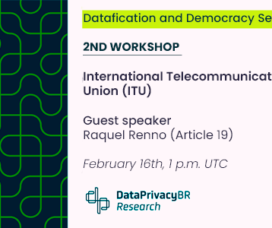
Our second workshop of a series about technical forum talks about the International Telecommunications Union
In the second meeting of the Datafication and Democracy Workshop Series, we received Raquel Renno, Digital Programme Officer of Article 19, who spoke about the International Telecommunication Union (ITU) for third sector organizations.
-
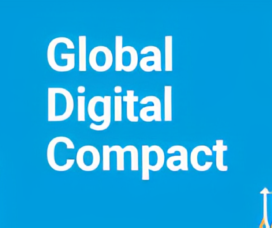
Let’s stay tuned for the Global Digital Compact
What is the Global Digital Compact and why is it important to keep an eye on it?
-

Why should we all pay attention to the Brazilian Digital ID system?
The implementation of digital identity systems is increasing around the world, especially in Global Southern countries. The model widely adopted is known as Big ID, promoted by or linked to public administration bodies which use centralized biometric databases to identify and authenticate citizens (Access Now, 2021).
DataPrivacyBr Research | Content under licensing CC BY-SA 4.0

